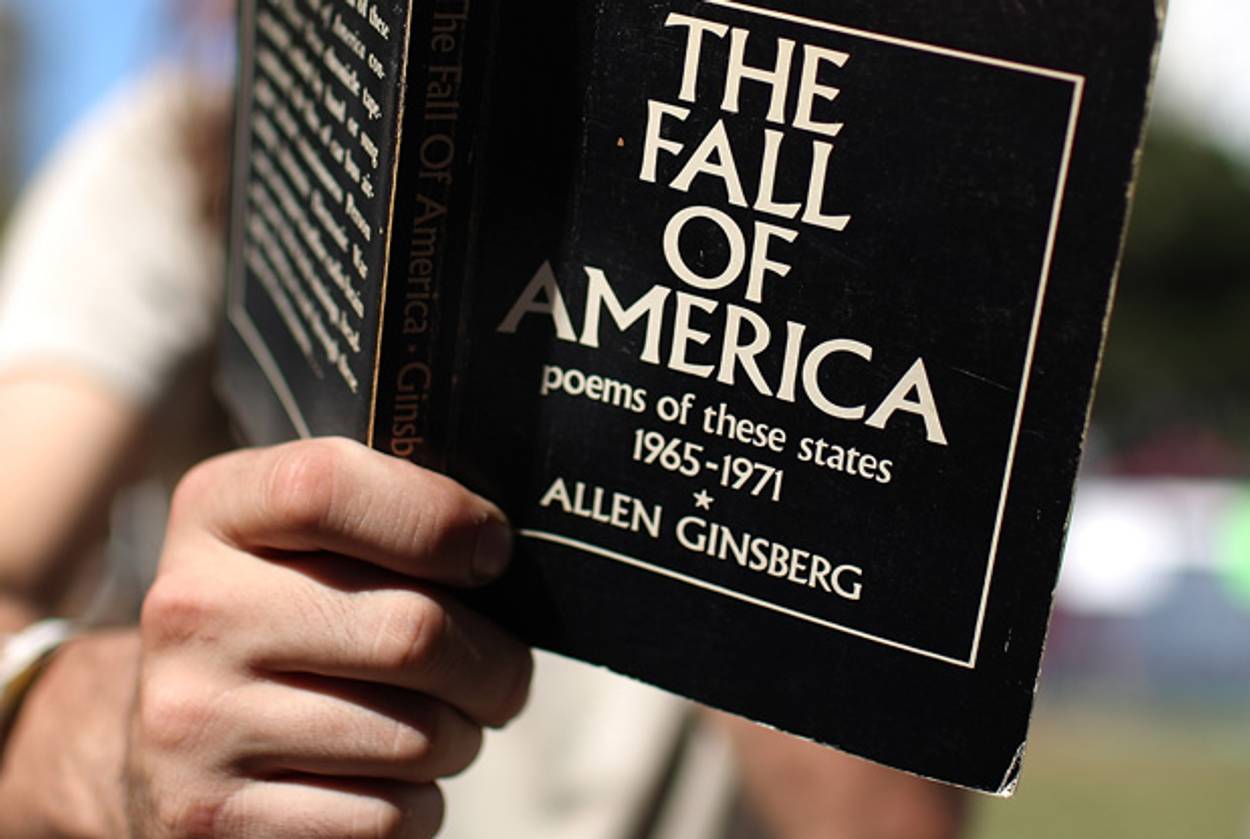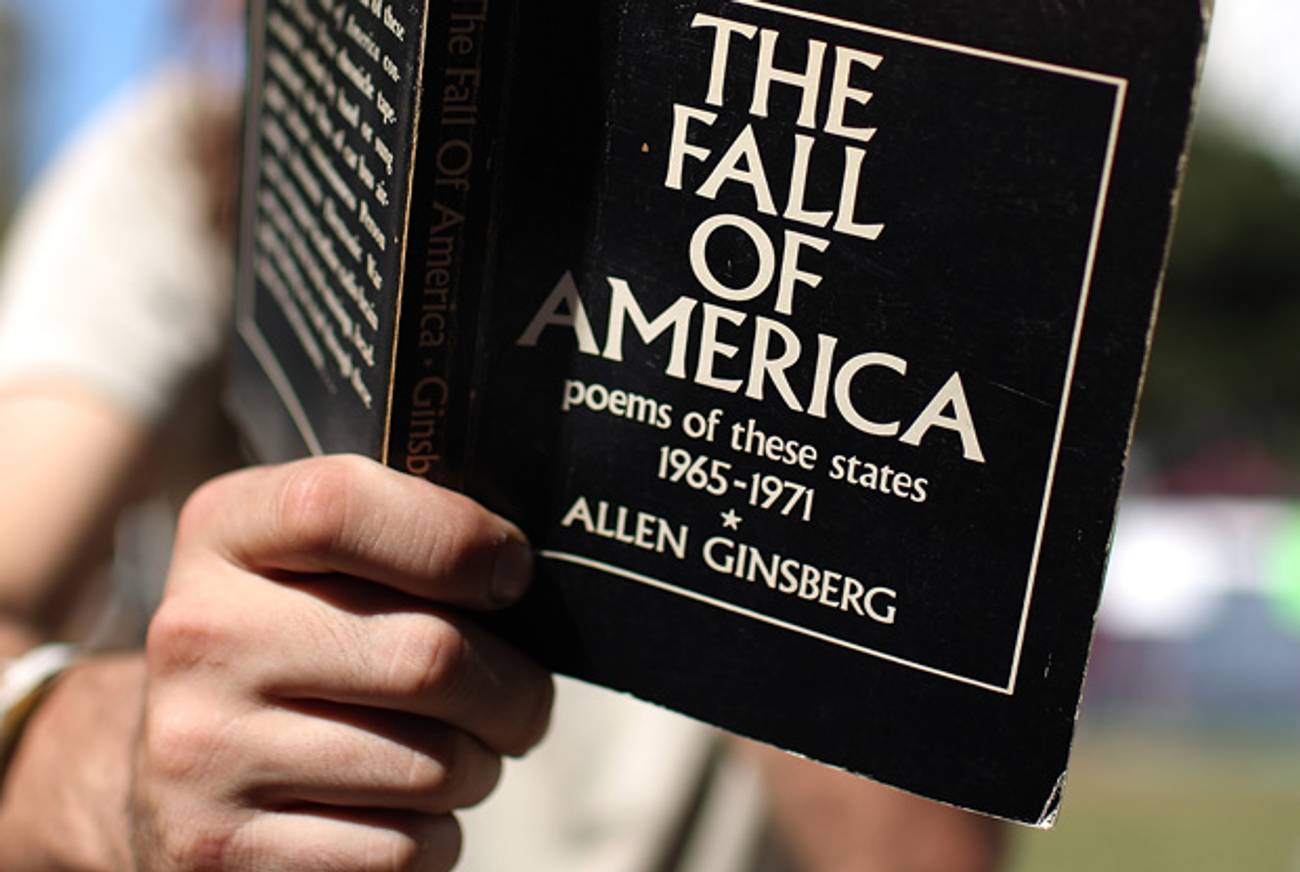Dear America
How Allen Ginsberg’s letters were an extension of his poetry




Reading The Letters of Allen Ginsberg is an unexpectedly moving experience. It is unexpected because, 11 years after the poet’s death and some 50 years since he wrote his major poems, “Howl” and “Kaddish,” there can be few readers who have not already decided how they feel about Ginsberg—whether they love him, with the special ardency he inspired in his disciples, or whether they disdain him, as so much of the American literary establishment, and especially its Jewish subdivision, did and does. Beat saint or master self-promoter, modernist innovator or post-literate sloven, prophet of liberation or glorifier of drugs and crime: the battle lines around Ginsberg have been drawn for several generations. Yet his letters show that, even if every count in the indictment is true, there was something rare and genuine about Allen Ginsberg. He may have been a fool, but he was a holy fool; and next to his holiness, the maturity and realism of his critics can look a bit unlovely.
Take, for instance, the letter Ginsberg wrote to Gregory Corso from Benares, India, in 1963. It was a moment in the Cold War when cultural diplomacy was in vogue, and the State Department regularly sent American writers on missions to the Third World. Ginsberg, however, had nothing to do with official patronage; he was not in India as a spokesman but as a seeker. And so he was free to see and do things that American professors couldn’t. One day, Ginsberg and Peter Orlovsky, his longtime companion, noticed a dying beggar on the street:
hideous skeleton-like Buchenwald covered with brown loose feces and flies on huge yellow sores on hips and elbows, crouched in fetal position, naked in curve of urinal wall nearby, obviously dying. . . . I couldn’t stand seeing like that and cheerfully gave him some milk.
Over the next days, Ginsberg personally bathed the man in the Ganges; tended to his ear, which was infested with maggots; fed him, took him to a doctor, showed him how to take penicillin. When the man started to recover, Ginsberg and Orlovsky took him to a hospital, where his family finally reclaimed him.
“Anyway, that’s my soap opera for the month,” Ginsberg wrote self-deprecatingly. But there is no mistaking the genuine compassion and selflessness of his actions. He was not afraid of the sick and wretched, the way most of us are. And he could not have been so fearless if he himself had not embraced wretchedness, in his life and in his work. Around the same time Ginsberg was writing “Kaddish,” his shockingly direct account of his mother’s insanity and death, Robert Lowell was treating his own mental illness in the pioneering poems of Life Studies. Yet just as it is impossible to imagine Lowell ministering to a beggar by the Ganges, so one cannot mistake the brilliant artfulness of Life Studies for the sacred abjection of “Kaddish”:
One time I thought she was trying to make me come lay her—flirting to herself at sink—lay back on huge bed that filled most of the room, dress up round her hips, big slash of hair, scars of operations, pancreas, belly wounds, abortions, appendix, stitching of incisions pulling down in the fat like hideous thick zippers—ragged long lips between her legs—What, even, smell of asshole? I was cold—later revolted a little, not much—seemed perhaps a good idea to try—know the Monster of the Beginning-World. Perhaps—that way. Would she care? She needs a lover.
Yisborach, v’yistabach, v’yispoar, v’yisroman, v’yisnaseh, v’yishador, v’yishalleh, v’yishallol, sh’meh d’kudsho, b’rich hu.
This is blasphemy, but not the calculating, cynical blasphemy of, say, Andres Serrano immersing a crucifix in urine. It is, rather, the obscenity of true suffering, which violates all the boundaries that usually order our lives.
Ginsberg was much more polarizing than most poets, even most avant-garde poets, because he did not see himself as simply an artist. While he was very learned about English literature—not for nothing was he a favorite student of Lionel Trilling and Mark Van Doren at Columbia in the 1940s—he did not want his writing to be approached with the discriminating, hypothetical intelligence we ordinarily bring to literature. His writing was, instead, a kind of speech, directed not to the “poetry reader” but to the whole mind and soul. He was a prophet who used verse to chastise and exhort his people, as in the famous lines from “Howl”:
Moloch whose love is endless oil and stone! Moloch whose soul is electricity and banks! Moloch whose poverty is the specter of genius! Moloch whose fate is a cloud of sexless hydrogen! Moloch whose name is the mind!
When he chose to call 1950s America by the name of the evil god to whom the Canaanites sacrificed their children, Ginsberg deliberately claimed for himself the mantle of the Hebrew prophets. The message he delivered to his Cold War generation is exactly the one that Amos gave the Israelites:
I hate, I despise your feast days, and I will not smell in your solemn assemblies. Though ye offer me burnt offerings and your meat offerings, I will not accept them: neither will I regard the peace offerings of your fat beasts. Take thou away from me the noise of thy songs; for I will not hear the melody of thy viols. But let judgment run down as waters, and righteousness as a mighty stream. Have ye offered unto me sacrifices and offerings in the wilderness forty years, O house of Israel? But ye have borne the tabernacle of your Moloch and Chiun your images, the star of your god, which ye made to yourselves.
Hardly a middle schooler in America is unfamiliar with the line about judgment and righteousness, because Martin Luther King Jr. quoted it in his “I Have a Dream” speech. But for obvious reasons, King did not draw out the implication of Amos’s metaphor, which is that the waters of judgment are about to drown a sinful people.
Ginsberg could afford to dwell on the prophet’s threat, as well as his promise, because he was not a political leader and had no constituency to answer to. It would not be fair to say that Ginsberg was unpractical—on the contrary, one of the surprises of The Letters is how thoroughly he researched matters like the drug laws and the Vietnam War, so that he could berate journalists and politicians for not doing the same. Writing to the New York Times columnist C.L. Sulzberger in 1970, Ginsberg cited numerous sources on the CIA’s involvement in the Laotian heroin trade, urging the Times to explore the subject further: “A little professionalism, please!” he demands. Similarly, he refers Ed Koch, then a congressman, to detailed studies of British drug laws: “I enclose a little documentation…please Xerox and return this to me rapidly.”
Yet while Ginsberg could be practical, even canny, when it came to arguing politics—and still more so when it came to earning publication and prizes for the work of his fellow Beats—the essence of his moral vision was not pragmatic. He did not want poetry to do the painstaking, unglamorous work of making the world better, but to confront the world with its evil, to shame and shock it into good. That is why he could write, absurdly but entirely sincerely, to Time in 1959, “You are an instrument of the Devil and crucify America with your lies.” The editors of Time, of course, threw the letter in the trash. But a prophet does not have to get results to deserve honor.
Adam Kirsch is a poet and literary critic, whose books include The People and the Books: 18 Classics of Jewish Literature.